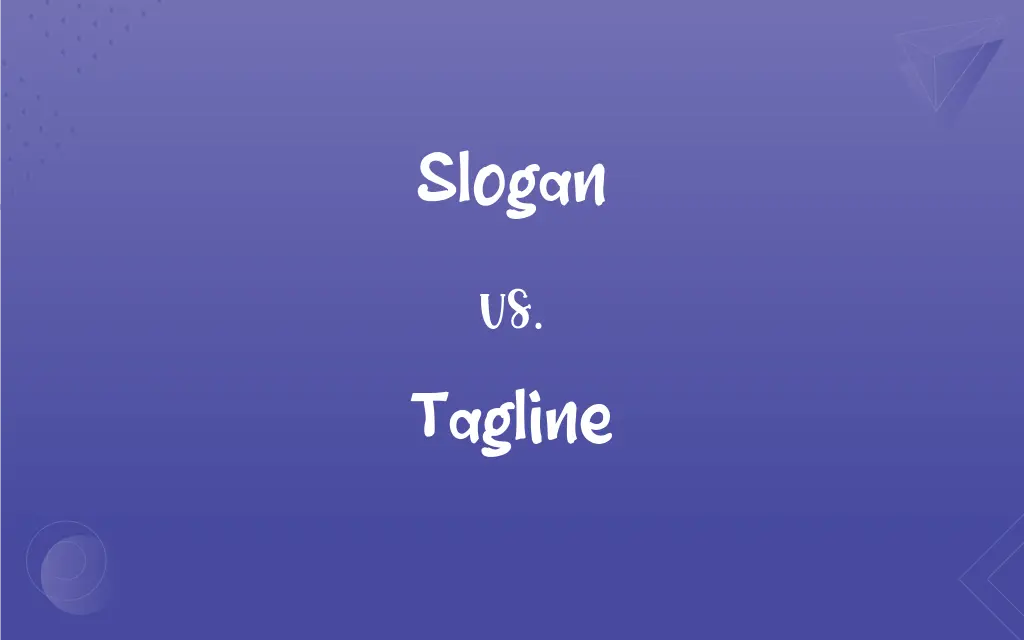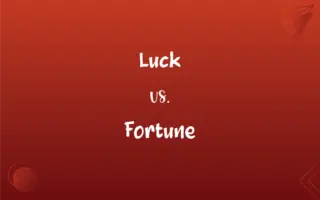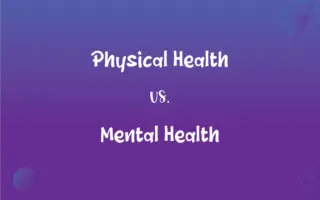Slogan vs. Tagline: What's the Difference?
Edited by Aimie Carlson || By Janet White || Published on November 16, 2023
A slogan often emphasizes a brand's values or purpose, while a tagline is a catchy phrase associated with a product or campaign.

Key Differences
A slogan is a memorable motto or phrase often used in advertising campaigns or political movements. Its primary role is to emphasize the philosophy, purpose, or main attributes of a brand or cause. On the other hand, a tagline is closely linked to a specific product, service, or campaign, highlighting its unique selling proposition or a specific feature.
In branding, a slogan typically encapsulates the essence of the company or its overarching mission. It often remains consistent across different campaigns and products to communicate the core values of a brand. Conversely, a tagline might change based on marketing strategies, new product launches, or specific advertising campaigns, aiming to engage the audience effectively.
While both slogan and tagline serve to create brand recall and identity, their application can vary significantly. For example, a company might use the same slogan for decades to maintain its brand image, while its taglines may evolve with new products or market trends. Essentially, while a slogan provides a broader perspective of a brand's essence, a tagline is more targeted, emphasizing a specific product or service's benefits.
The beauty of a slogan is its ability to communicate a brand's mission, vision, or values succinctly. It's a statement that often resonates with the target audience and enhances brand loyalty. In contrast, the charm of a tagline lies in its short, catchy nature, making a specific product or campaign instantly recognizable and enticing to potential customers.
Comparison Chart
Primary Function
Emphasizes brand values or purpose.
Associated with a specific product or campaign.
ADVERTISEMENT
Duration & Consistency
Typically longer-lasting and consistent.
May change with campaigns or product launches.
Focus
Broad, capturing brand essence.
Targeted, highlighting unique features.
Usage
Seen in corporate branding and political movements.
Common in specific marketing campaigns.
Connection to Brand
Represents overarching mission or values.
Links to a specific product, service, or campaign.
Slogan and Tagline Definitions
Slogan
A memorable motto used in advertising.
The company's slogan resonated with its target audience.
ADVERTISEMENT
Tagline
A line encapsulating the essence of a specific campaign.
The event's tagline attracted a diverse audience.
Slogan
A phrase representing a company's philosophy.
The new slogan aligned with the brand's refreshed image.
Tagline
A phrase making a product or service recognizable.
The beverage's tagline made it stand out on the shelves.
Slogan
A chant or phrase used in political movements.
The protest's slogan spread rapidly across the country.
Tagline
A short, memorable line from marketing campaigns.
The new fragrance's tagline intrigued potential customers.
Slogan
A phrase emphasizing brand values.
Their slogan underscored their commitment to sustainability.
Tagline
A catchy phrase linked to a product.
The cereal's tagline emphasized its health benefits.
Slogan
A phrase expressing the aims or nature of an enterprise, organization, or candidate; a motto.
Tagline
A succinct line highlighting unique selling points.
The movie's tagline captured its thrilling essence.
Slogan
A phrase used repeatedly, as in advertising or promotion
"all the slogans and shibboleths coined out of the ideals of the peoples for the uses of imperialism" (Margaret Sanger).
Tagline
An often repeated phrase associated with an individual, organization, or commercial product; a slogan.
Slogan
A battle cry of a Scottish clan.
Tagline
An ending line, as in a play or joke, that makes a point.
Slogan
A distinctive phrase of a person or group of people (such as a movement or political party); a motto.
Tagline
The punch line of a joke.
Slogan
(advertising) A catchphrase associated with a product or service being advertised.
Tagline
(marketing) An advertising slogan.
Slogan
(obsolete) A battle cry among the ancient Irish or highlanders of Scotland.
Tagline
(computing) A pithy quotation habitually appended to a signature in email, newsgroups, etc.
Slogan
The war cry, or gathering word, of a Highland clan in Scotland.
Tagline
A line attached to a draft of cargo or a container to provide control and minimize pendulation of cargo during lifting operations.
Slogan
A distinctive motto, phrase, or cry used by any person or party to express a purpose or ideal; a catchphrase; a rallying cry.
Tagline
A light rope attached to an object being hoisted by a crane, used to guide it while lifting or lowering.
Slogan
A favorite saying of a sect or political group
Tagline
(transitive) To supply with an advertising slogan; to market as.
Slogan
A recurrent phrase associated with an organization.
The charity's slogan was known by people nationwide.
FAQs
Is a slogan always linked to commercial entities?
No, slogans can also be associated with political movements, causes, or public awareness campaigns.
Which is broader in scope, a slogan or a tagline?
A slogan often has a broader scope, emphasizing brand values, while a tagline is more specific.
How often should a tagline change?
A tagline can change based on marketing strategies, product launches, or evolving market trends.
Do both slogan and tagline aim for brand recall?
Yes, both aim to create a memorable impression, though their focus and application might differ.
Is a tagline essential for every product?
Not always, but a compelling tagline can enhance a product's appeal and distinguish it in the market.
Can a tagline be a question?
Yes, some taglines pose questions to engage or provoke thought among potential customers.
Can a company have both a slogan and multiple taglines?
Yes, a company can have a consistent slogan and various taglines for different campaigns or products.
Why is a slogan important for a brand?
A slogan communicates a brand's mission, values, or philosophy, fostering loyalty and recognition.
What's the main goal of a tagline?
A tagline aims to make a product or campaign instantly recognizable and highlight its unique selling points.
Can a tagline evolve into a company's slogan?
Yes, if a tagline resonates strongly and represents the brand's essence, it might become its slogan.
How long should a slogan be?
A slogan should be concise, memorable, and effectively convey the brand's essence or message.
Should a slogan align with a brand's mission statement?
Ideally, yes. A slogan should resonate with and reflect a brand's mission and values.
What makes a tagline effective?
An effective tagline is memorable, relevant, and successfully highlights a product's unique attributes.
Can a slogan be controversial?
While most slogans aim to be universally appealing, some might be controversial to draw attention or make a statement.
Can a tagline be humorous?
Yes, many successful taglines use humor to engage audiences and make products memorable.
Is a slogan always positive?
Generally, slogans have a positive tone to inspire trust and loyalty, but they can vary based on context.
How often should companies review their taglines?
Companies should review taglines as market conditions, product lines, or marketing strategies evolve.
Are slogans only used in advertising?
No, slogans are prevalent in advertising, but they're also used in political and social movements.
Should a slogan be trademarked?
To protect brand identity, many companies choose to trademark their slogans.
Can a tagline be used across different media platforms?
Yes, taglines can be used across TV, print, online, and other media platforms for consistent branding.
About Author
Written by
Janet WhiteJanet White has been an esteemed writer and blogger for Difference Wiki. Holding a Master's degree in Science and Medical Journalism from the prestigious Boston University, she has consistently demonstrated her expertise and passion for her field. When she's not immersed in her work, Janet relishes her time exercising, delving into a good book, and cherishing moments with friends and family.
Edited by
Aimie CarlsonAimie Carlson, holding a master's degree in English literature, is a fervent English language enthusiast. She lends her writing talents to Difference Wiki, a prominent website that specializes in comparisons, offering readers insightful analyses that both captivate and inform.































































